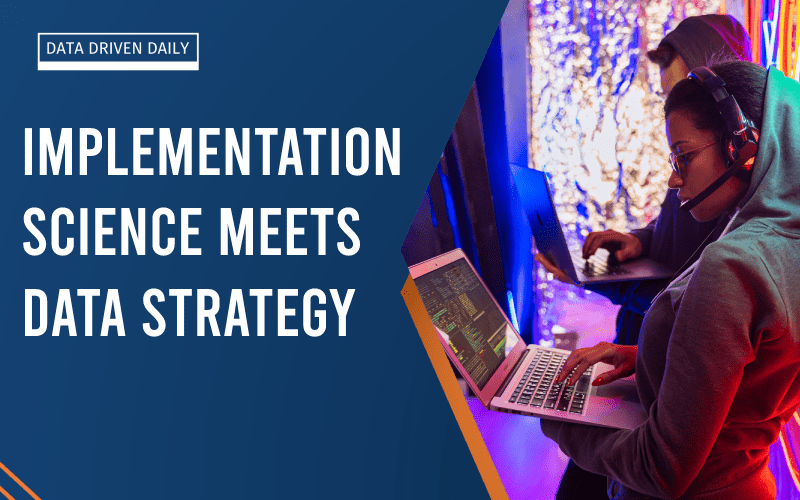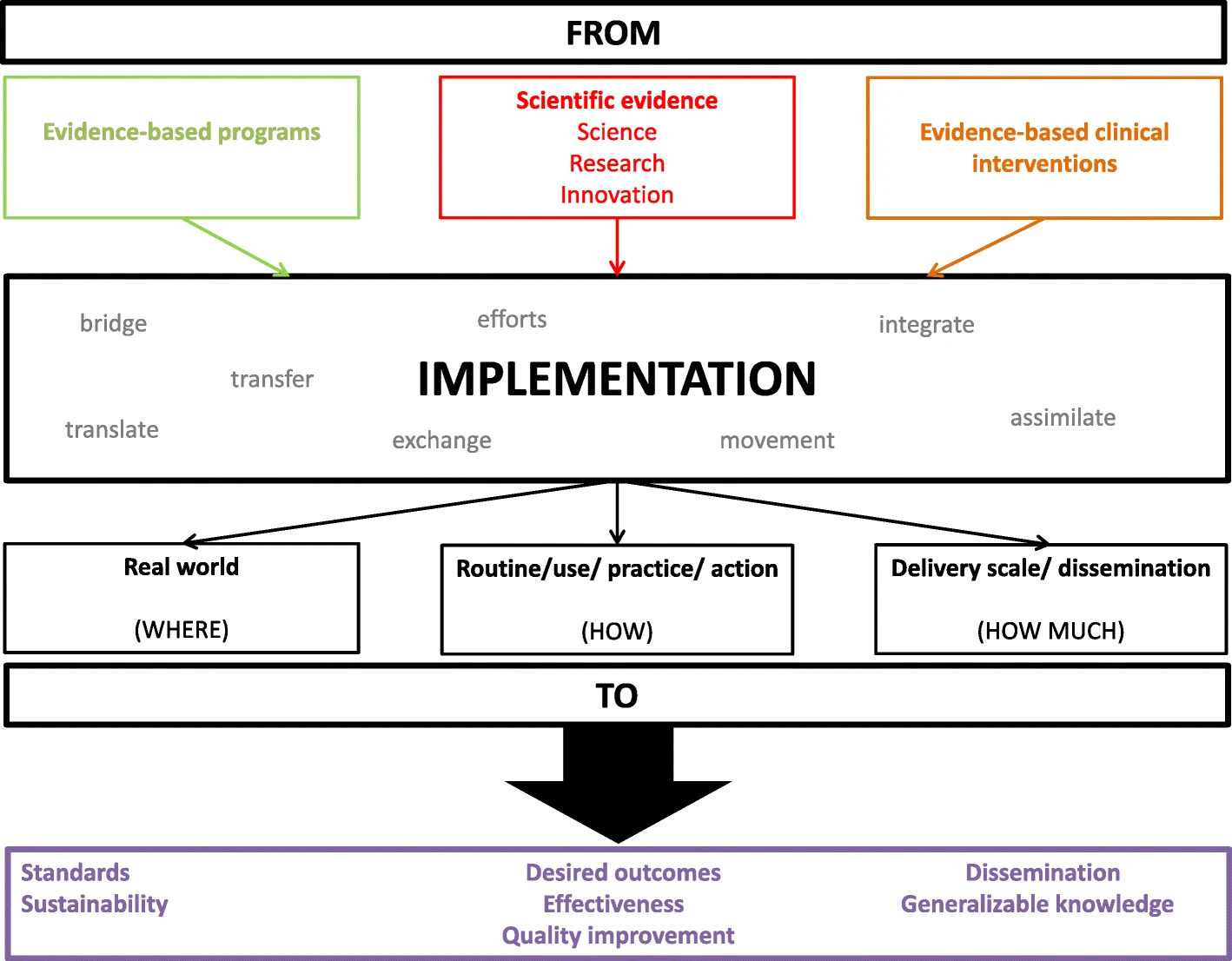Data Strategy meets Implementation Science
The successful implementation of data strategy is critical for organizations to stay competitive and thrive.
While change management is often seen as the go-to method for implementing new strategies, it may not always be evidence-based or backed by research.
Enter implementation science, a growing field that offers a systematic approach to adopting evidence-based practices within organizations[1].
This article aims to explore how implementation science can enhance the implementation of data strategies within large organizations.

| Key Takeaways |
|---|
| 1. Implementation science offers evidence-based methods for effective change management in organizations. |
| 2. Assessing organizational readiness and engaging stakeholders are crucial for successful data strategy implementation. |
| 3. A tailored implementation plan and robust communication strategy foster collaboration and transparency. |
| 4. Continuous monitoring, evaluation, and improvement are vital to ensure the success of data-driven initiatives. |
| 5. Cultivating a culture of data-driven decision-making leads to sustainable, long-term success in data strategy implementation. |
Understanding Implementation Science and Change Management
Definition and Goals of Implementation Science
Implementation science is an interdisciplinary field that seeks to understand and promote the systematic uptake of research findings and evidence-based practices into routine practice[1].

It encompasses various theories, models, and frameworks that guide the implementation process[4]. The ultimate goal of implementation science is to bridge the gap between research and practice, ensuring that the best available evidence is applied in real-world settings.
Comparison with Change Management in the Business Context
Change management refers to the process of managing and guiding an organization through transitions, such as adopting new technologies, processes, or strategies.
While both implementation science and change management share similar objectives, implementation science stands out for its rigorous, evidence-based approach. It leverages research findings to inform the development and implementation of strategies, fostering better outcomes[2].
The Value of Evidence-Based Approaches in Organizational Change
Organizational change can be complex and challenging. By applying evidence-based approaches, organizations can reduce the risk of failure and improve the likelihood of successful change.
Implementation science offers a systematic, research-informed method for planning, executing, and evaluating change efforts, ensuring that organizations can achieve their strategic objectives and remain agile in a rapidly evolving business environment[3].
Change Management: A Common Pitfall in Organizations
Change management is a widely adopted approach for guiding organizations through transitions, such as adopting new technologies, processes, or strategies. Despite its popularity, change management often falls short in delivering successful outcomes. One key reason is that traditional change management methods are not always evidence-based or grounded in scientific research.
Many organizations rely on anecdotal experiences, best practices, and intuition when designing and executing change management initiatives. While these factors may provide some guidance, they do not necessarily guarantee success. As a result, organizations often struggle to achieve their intended outcomes, leading to wasted resources, employee resistance, and missed opportunities.
Applying Implementation Science Principles to Data Strategy Implementation
Assessing Organizational Readiness for Change
Understanding the organizational context is crucial for successful data strategy implementation. Implementation science frameworks, such as the Consolidated Framework for Implementation Research (CFIR)[2], can help organizations assess their readiness for change. These frameworks provide a comprehensive approach to evaluate factors that may influence the adoption of new strategies, including organizational culture, resources, and existing processes.
Engaging Stakeholders
Involving key departments and personnel in the implementation process ensures that the data strategy is aligned with organizational goals and objectives. Engaging stakeholders early on fosters buy-in and commitment, which are essential for successful implementation[5].
By creating a shared vision and understanding of the strategy, organizations can facilitate a smoother transition and maximize the benefits of their data-driven initiatives.
Developing a Tailored Implementation Plan
Each organization has unique challenges and needs that must be addressed when implementing a data strategy. A tailored implementation plan should be developed based on the organization’s context and the findings from the readiness assessment[3].
This plan should outline clear goals, milestones, timelines, and responsibilities, ensuring that all stakeholders are aware of their roles and expectations.
Providing Training and Support
Building capacity among employees is crucial for the successful implementation of a data strategy. Organizations should invest in training and support to ensure that employees can effectively use and analyze data[6].
This may include workshops, seminars, and ongoing coaching to help employees develop the necessary skills and knowledge to navigate the data-driven landscape.
Establishing a Communication Strategy
Transparency is key when implementing a data strategy. A well-planned communication strategy can help manage expectations and foster a sense of ownership among stakeholders[7].
This may involve regular updates on progress, successes, and challenges, as well as opportunities for feedback and collaboration.
Monitoring, Evaluation, and Continuous Improvement
Identifying Implementation Outcome Measures
To assess the success of a data strategy implementation, it is essential to identify appropriate outcome measures[8]. These measures may include process indicators (e.g., the number of employees trained in data analysis), as well as outcome indicators (e.g., improvements in data-driven decision-making).
By tracking these measures, organizations can evaluate the effectiveness of their implementation efforts and make data-informed decisions.
Tracking Progress and Making Necessary Adjustments
Monitoring and evaluation are critical components of the implementation process. Organizations should track their progress towards achieving implementation goals and make adjustments as needed[9].
This may involve addressing barriers, leveraging facilitators, and refining strategies to ensure that the data strategy is effectively integrated into the organization.
Addressing Barriers and Facilitators Throughout the Process

Implementation science emphasizes the importance of understanding and addressing barriers and facilitators throughout the implementation process1. Organizations should proactively identify potential obstacles and develop strategies to overcome them, as well as leverage factors that can facilitate the adoption of the data strategy.
Fostering a Culture of Data-Driven Decision-Making
Promoting the Value of Data-Driven Decisions
To sustain the impact of the data strategy, organizations should promote the value of data-driven decisions across all levels of the organization. This may involve highlighting success stories, sharing best practices, and emphasizing the benefits of using data to inform decision-making.
Recognizing and Rewarding Data-Driven Practices
Recognizing and rewarding data-driven practices can help reinforce the importance of the data strategy and foster a culture of data-driven decision-making. Organizations should implement incentive systems that acknowledge and reward employees for their contributions to data-driven initiatives.
Ensuring the Sustainability of the Data Strategy
Long-term success requires organizations to ensure the sustainability of their data strategy. This may involve regularly reviewing and updating the strategy, investing in ongoing training and support, and integrating data-driven decision-making into the organization’s culture and values.
The Data Strategy Implementation Checklist
As you work towards implementing a data strategy in your organization, it’s essential to have a structured approach to ensure success. The following checklist offers a step-by-step guide to help you follow evidence-based implementation principles for your data strategy. By following these steps, you’ll be better prepared to navigate challenges, engage stakeholders, and foster a culture of data-driven decision-making.
| Data Strategy Implementation Checklist | ✅ |
|---|---|
| 1. Understand the organizational context | |
| 2. Assess organizational readiness | |
| 3. Identify key stakeholders | |
| 4. Align data strategy with organizational goals | |
| 5. Develop a tailored implementation plan | |
| 6. Provide training and support | |
| 7. Establish a communication strategy | |
| 8. Monitor and evaluate progress | |
| 9. Address barriers and facilitators | |
| 10. Foster a culture of data-driven decision-making |
Final Thoughts
Implementation science offers a valuable, evidence-based approach to enhance the implementation of data strategies within large organizations. By leveraging implementation science principles, organizations can improve the adoption and integration of data-driven initiatives, fostering a culture of data-driven decision-making and ensuring long-term success. Now is the time to start applying these principles and transform your organization into a data-driven powerhouse.
Consider taking an in-depth course on data strategy to really deep-dive onto the subject of data strategy in organizations.
References
- Eccles, M. P., & Mittman, B. S. (2006). Welcome to Implementation Science. Implementation Science, 1(1), 1. https://doi.org/10.1186/1748-5908-1-1
- Damschroder, L. J., Aron, D. C., Keith, R. E., Kirsh, S. R., Alexander, J. A., & Lowery, J. C. (2009). Fostering implementation of health services research findings into practice: a consolidated framework for advancing implementation science. Implementation Science, 4(1), 50. https://doi.org/10.1186/1748-5908-4-50
- Powell, B. J., Waltz, T. J., Chinman, M. J., Damschroder, L. J., Smith, J. L., Matthieu, M. M., Proctor, E. K., & Kirchner, J. E. (2015). A refined compilation of implementation strategies: results from the Expert Recommendations for Implementing Change (ERIC) project. Implementation Science, 10(1), 21. https://doi.org/10.1186/s13012-015-0209-1
- Nilsen, P. (2015). Making sense of implementation theories, models and frameworks. Implementation Science, 10(1), 53. https://doi.org/10.1186/s13012-015-0242-0
- Proctor, E., Silmere, H., Raghavan, R., Hovmand, P., Aarons, G., Bunger, A., Griffey, R., & Hensley, M. (2011). Outcomes for implementation research: conceptual distinctions, measurement challenges, and research agenda. Administration and Policy in Mental Health, 38(2), 65-76. https://doi.org/10.1007/s10488-010-0319-7
- Brownson, R. C., Colditz, G. A., & Proctor, E. K. (Eds.). (2018). Dissemination and implementation research in health: Translating science to practice (2nd ed.). Oxford University Press. https://doi.org/10.1093/oso/9780190683214.001.0001
- Weiner, B. J., Lewis, C. C., Stanick, C., Powell, B. J., Dorsey, C. N., Clary, A. S., Boynton, M. H., & Halko, H. (2017). Psychometric assessment of three newly developed implementation outcome measures. Implementation Science, 12(1), 108. https://doi.org/10.1186/s13012-017-0635-3
- Wensing, M., & Grol, R. (2019). Knowledge translation in health: How implementation science could contribute more. BMC Medicine, 17(1), 88. https://doi.org/10.1186/s12916-019-1322-9
- Raghavan, R. (2018). The role of economic evaluation in dissemination and implementation research. In R. C. Brownson, G. A. Colditz, & E. K. Proctor (Eds.), Dissemination and implementation research in health: Translating science to practice (2nd ed., pp. 89-106). Oxford University Press. https://doi.org/10.1093/oso/9780190683214.003.0006.
Ben is a full-time data leadership professional and a part-time blogger.
When he’s not writing articles for Data Driven Daily, Ben is a Head of Data Strategy at a large financial institution.
He has over 14 years’ experience in Banking and Financial Services, during which he has led large data engineering and business intelligence teams, managed cloud migration programs, and spearheaded regulatory change initiatives.